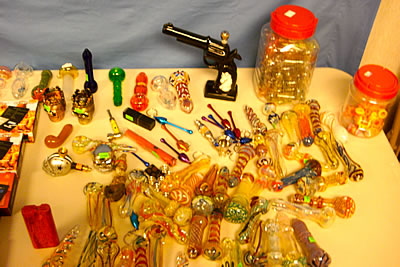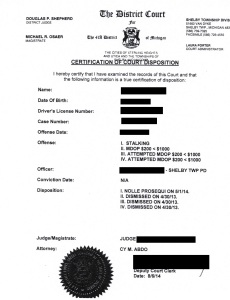
Possession or sale of drug paraphernalia is a crime in Michigan
Possession or sale of drug paraphernalia is a criminal offense in Michigan. A person may be charged with the offense “possession of drug paraphernalia” even though the person does not possess any drugs at the same time. Most items the law considers drug paraphernalia are harmless and not otherwise illegal. However, when the items are associated with past or present illegal drug use, criminal charges may be pursued.
The ramifications of a criminal record, even for a minor offense, can last a lifetime. A criminal record can have a negative impact on travel, employment, educational opportunities, loans and leases. In this article, we explain how an attorney can help you or a loved one avoid a criminal record for a drug crime.
Making the assumption that a drug paraphernalia charge is not a big deal is a big mistake. By rushing to the courthouse to plead guilty without a lawyer, you will wind up with a criminal record. If you are facing any criminal matter, talk to a lawyer first about your options and whether there is an efficient way to out of the system clean with a clean record!
Michigan’s drug paraphernalia statute
According to Michigan’s drug paraphernalia law, MCL 333.7451, Drug paraphernalia means any equipment, product, material, or combination of equipment, products, or materials, which is specifically designed for use in planting; propagating; cultivating; growing; harvesting; manufacturing; compounding; converting; producing; processing; preparing; testing; analyzing; packaging; repackaging; storing; containing; concealing; injecting, ingesting, inhaling, or otherwise introducing into the human body a controlled substance; including, but not limited to, all of the following:
Defending Drug Paraphernalia Cases
Possession of drug paraphernalia is a crime which is classified as a misdemeanor. In Michigan, misdemeanor cases such as possession of drug paraphernalia, are handled in the district courts. There are 9 district courts in the county of Macomb as follows:
- 37th District Court (Warren, Centerline)
- 38th District Court (Eastpointe)
- 39th District Court (Roseville, Fraser)
- 40th District Court (St. Clair Shores)
- 41A District Court (Shelby Township, Utica, Macomb Township)
- 41A District Court ( Sterling Heights)
- 41B District Court (Clinton Township, Harrison Township, Mount Clemens)
- 42-1 District Court (Romeo, Washington Township)
- 42-2 District Court (New Baltimore, Chesterfield Township)
Possession of drug paraphernalia does not belong on your criminal record. Even if you do not have a drug abuse problem, you will have a hard time convincing others that may have access to your record. There are many neat and efficient ways to resolve possession of drug paraphernalia in the Macomb County District Courts to get it DISMISSED. The following provisions of law are widely used to get eligible crimes DISMISSED:
- Consent calendar (age 17 and under): A name given for a juvenile disposition that results in NO RECORD and NO CONVICTION
- HYTA (age 18 but before age 26): The HYTA statute is only available for youthful offenders to get eligible criminal matters DISMISSED with NO PUBLIC RECORD.
- Deferral: A deferral is typically used pursuant to MCL 771.1 to allow a person to earn a dismissal or other leniency after a period of compliance. At the end of the period (1 year for example), which is known as the deferral period, a criminal matter is subject to leniency, dismissal or reduction of the charge(s).
What if drugs are found by the police along with drug paraphernalia
Possession of drug paraphernalia rarely happens by itself and it often accompanied with other criminal charges, such as possession of illegal drugs and maintaining a drug house. Drugs are classified from Schedule 1 to Schedule 5. Schedule I drugs, substances, or chemicals are defined as drugs with no currently accepted medical use and a high potential for abuse. Some examples of Schedule I drugs are: heroin, ecstasy, methamphetamine. All Schedule 1 drug possession crimes are felonies which can carry long term imprisonment and substantial fines. Most drug possession crimes are felonies requiring criminal felony representation. The penalties for illegal “possession” of drugs are as follows:
- Possession of heroin and cocaine can carry up to 4 years in prison and up to a $25,000.00 fine.
- Possession of ecstasy and methamphetamine can carry up to 10 years in prison and up to a $15,000.00 fine.
- Possession of analogues (Xanax, Adderall) without a valid prescription can carry up to 2 years in prison.
Getting a local experienced Macomb County drug crime attorney is a good first step if you are looking to get your drug charges dismissed. MCL 333.7411 is specifically meant to be used for any misdemeanor or felony drug crime involving “use or possession” of drugs, but not for drug crimes involving “delivery or manufacturing”. We can also consent calendar, HYTA and MCL 771.1 to get a drug crime dismissed or reduced from a felony to a misdemeanor.
Search without a warrant based upon plain view or consent
Drug paraphernalia and drug crimes are almost always based upon a search and seizure that is conducted by the police. A search of a person or motor vehicle requires the police to have a warrant or other legal grounds to conduct a search without a warrant. A warrant is not required if something is in “plain view” or if the police obtain voluntary “consent” to conduct a search by someone with proper authority. In order to conduct a consent search, the person whose property is being searched must voluntarily waive his or her Fourth Amendment rights. However, the police do not always follow the rules when conducting a consent search. A consent search can be fought on the grounds that the police used unfair tactics or threats to get consent. Continue reading ›
 Michigan Criminal Lawyer Blog
Michigan Criminal Lawyer Blog





